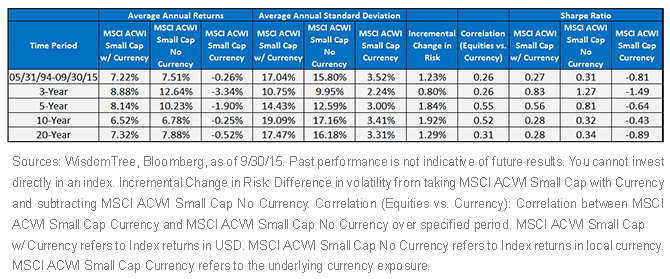Introducing the WisdomTree Global Hedged SmallCap Dividend Fund


 Given the consistent volatility reduction when currency risk has been removed, investors can see how currency-hedged strategies might serve as a better strategic baseline exposure for global equities—and that the active decision would be to add in the currency risk if/when an investor has a positive view on it. Very few dividend funds focus on global small-cap companies, and even fewer hedge the currency risk.2
Now, with the launch of the WisdomTree Global Hedged SmallCap Dividend Fund (HGSD), investors can capture the performance of a broad basket of small-cap dividend payers across the globe in one ETF, while also mitigating currency risk. HGSD is designed to track the performance of the WTGSH before fees and expenses. Although WTGSH is a newly constructed index, the methodology at its core uses the same fundamental rules-based process WisdomTree has been implementing in small caps around the world for almost a decade and the same currency-hedging methodology WisdomTree pioneered.
1Sources: WisdomTree, 10/31/15.
2Sources: WisdomTree, Bloomberg, 10/31/15.
Given the consistent volatility reduction when currency risk has been removed, investors can see how currency-hedged strategies might serve as a better strategic baseline exposure for global equities—and that the active decision would be to add in the currency risk if/when an investor has a positive view on it. Very few dividend funds focus on global small-cap companies, and even fewer hedge the currency risk.2
Now, with the launch of the WisdomTree Global Hedged SmallCap Dividend Fund (HGSD), investors can capture the performance of a broad basket of small-cap dividend payers across the globe in one ETF, while also mitigating currency risk. HGSD is designed to track the performance of the WTGSH before fees and expenses. Although WTGSH is a newly constructed index, the methodology at its core uses the same fundamental rules-based process WisdomTree has been implementing in small caps around the world for almost a decade and the same currency-hedging methodology WisdomTree pioneered.
1Sources: WisdomTree, 10/31/15.
2Sources: WisdomTree, Bloomberg, 10/31/15.
Important Risks Related to this Article
There are risks associated with investing, including possible loss of principal. Foreign investing involves special risks, such as risk of loss from currency fluctuation or political or economic uncertainty. Investments in emerging, offshore or frontier markets are generally less liquid and less efficient than investments in developed markets and are subject to additional risks, such as risks of adverse governmental regulation and intervention or political developments. Funds focusing their investments on certain sectors increase their vulnerability to any single economic or regulatory development. The Fund uses various strategies to attempt to minimize the impact of changes in applicable foreign currencies against the U.S. dollar, which may not be successful. Derivative investments can be volatile, and these investments may be less liquid than other securities, and more sensitive to the effects of varied economic conditions. The Fund invests in the securities included in, or representative of, its Index regardless of their investment merit, and the Fund does not attempt to outperform its Index or take defensive positions in declining markets. A Fund that has exposure to one or more sectors may be more vulnerable to any single economic or regulatory development. Please read the Fund’s prospectus for specific details regarding the Fund’s risk profile.
Hedging can help returns when a foreign currency depreciates against the U.S. dollar, but can hurt when the foreign currency appreciates against the U.S. dollar.
Dividends are not guaranteed, and a company’s future ability to pay dividends may be limited. A company currently paying dividends may cease paying dividends at any time.


